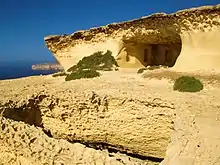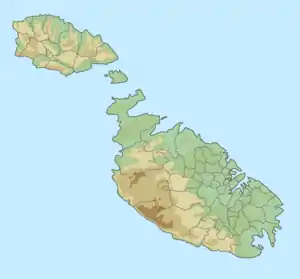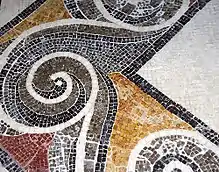 Rock-hewn chamber at Ras il-Wardija | |
 Shown within Malta | |
| Location | San Lawrenz, Gozo, Malta |
|---|---|
| Coordinates | 36°2′11.8″N 14°11′13.3″E / 36.036611°N 14.187028°E |
| Type | Religious complex, possibly a nymphaeum |
| History | |
| Material | Limestone |
| Founded | 3rd century BC |
| Abandoned | 4th century AD |
| Periods | Punic and Roman |
| Site notes | |
| Excavation dates | 1964–1967 |
| Archaeologists | Missione Archaeologica Italiana a Malta |
| Condition | Dilapidated |
| Ownership | George Spiteri |
| Public access | Limited |
Ras il-Wardija is a promontory in the limits of San Lawrenz, on the southwest coast of Gozo, Malta. It contains the remains of a Punic-Roman sanctuary, which was excavated by Italian archaeologists in the 1960s. The area is privately owned and it is currently in a dilapidated state.[1]
The site
Ras il-Wardija was probably first inhabited in the Bronze Age, in around 1500 BC. In around the 3rd century BC,[2] during the Punic period, a religious complex (probably a nymphaeum) was established in the area. Since the site is clearly visible from the sea, it might have also served as a beacon for ships travelling between the Maltese Islands and North Africa.[3]
The site remained in use throughout the Roman period. Carved crosses on the walls suggest that the site eventually became a Christian place of worship.[3] The site remained in use until around the 4th century AD.[2] A hermitage might have existed in the area during the medieval period.[4]
The main structural elements of the site are:
- a rock-hewn rectangular chamber, with a number of niches in the walls
- a T-shaped rock-hewn corridor leading to the chamber
- a water reservoir and a bell-shaped well, both rock-hewn
- the remains of an external masonry structure including an altar
The masonry structure has some similarities to the remains of the Punic-Roman sanctuary at Tas-Silġ in Marsaxlokk.[3]
Excavations and recent history
The area around Ras il-Wardija was used for defensive purposes during World War II.[3] The site was first excavated by the Missione Archaeologica Italiana a Malta (Archaeological Mission of Malta) between 1964 and 1967.[2] The temple was well preserved until the excavations, but it has since deteriorated.[5]
On 30 March 1988, it was discovered that an ancient graffito carved on one of the walls of the sanctuary had been stolen. The graffito shows a human figure with outstretched arms, in the shape of a cross. It has been suggested that the figure represents the Punic goddess Tanit, but it might also be a medieval representation of a Christian cross. The graffito was recovered in June 2011, and it is now on display at the Gozo Museum of Archaeology in the Cittadella.[3]
The land on which the sanctuary is located is privately owned by George Spiteri, and permission may be required in order to access the site.[5] It is listed on the National Inventory of the Cultural Property of the Maltese Islands.[2]
References
- ↑ Zammit, V. (1997, February 9). Is-Santwarju ta' Ras il-Wardija Għawdex. Mument: Pizzikanna, p. 3.
- 1 2 3 4 "Ras il-Wardija" (PDF). National Inventory of the Cultural Property of the Maltese Islands. 16 December 2011. Archived from the original (PDF) on 1 May 2016.
- 1 2 3 4 5 "Ras il-Wardija – the return of the lost graffito" (PDF). Superintendence of Cultural Heritage. 3 June 2011. Archived from the original (PDF) on 3 June 2016.
- ↑ Bugeja, Lino (10 January 2016). "Gozo – a historical and scenic cornucopia". Times of Malta. Archived from the original on 3 June 2016.
- 1 2 Barry, Duncan (25 May 2015). "Sanctuary advertised on Visit Gozo site but owner of land where temple stands has 'reservations'". The Malta Independent. Archived from the original on 11 August 2015.
![]() Media related to Ras il-Wardija at Wikimedia Commons
Media related to Ras il-Wardija at Wikimedia Commons
